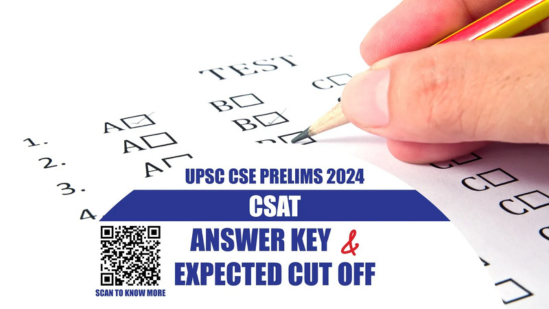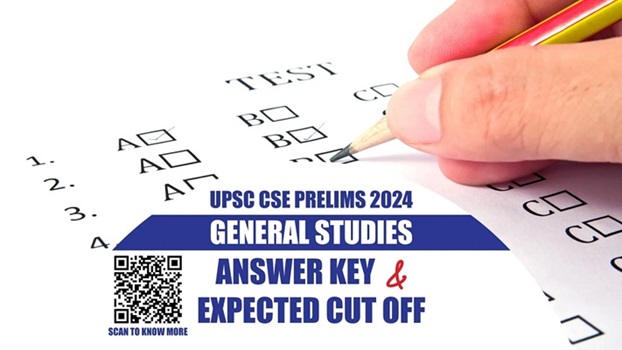The UPSC Prelims 2024 featured a pivotal examination component—the Civil Services Aptitude Test (CSAT). This review deeply explores the CSAT, evaluating its sections on Mathematics, Reasoning, and Reading Comprehension, analysing its overall difficulty, and offering strategic advice for those advancing to the Mains.
The observation about UPSC 2024 CSAT Paper
The CSAT can really throw you off if you’re unprepared for its twists and turns. Last year’s paper was a wake-up call for many aspirant who attempted the UPSC Prelims 2023. This year’s CSAT paper has returned to its roots with a few surprises. Seemingly, the difficulty level for this year’s paper is moderate compared to last year. In this year’s UPSC CSAT paper, the distribution of questions was notably varied across the sections. There were 35-36 questions in Mathematics, 17-18 in Reasoning, and 27 in Reading Comprehension. This structure is consistent with previous years, especially in the Reasoning and Reading Comprehension components.
Detailed Analysis of Difficulty Levels
Mathematics
This year’s mathematics section of the CSAT paper prominently focused on testing candidates through algebraic expressions and number theory, with specific emphasis on divisibility and prime numbers. Additionally, it featured questions like Time & Work , Profit & Loss etc.
In CSAT 2024 paper, a significant observation was the absence of questions from the topic of Permutation and Combination, a topic often regarded as challenging and complex. This omission relieved many aspirants, contrasting with the previous year’s more demanding content.
The exam included many questions typically covered in CSAT preparatory courses, focusing on concept-based understanding rather than rote memorisation. Of the 35 questions dedicated to Mathematics, many were aimed explicitly at testing proficiency in the Number system. This distribution suggests that the difficulty level of the Mathematics section ranged from moderate to challenging, aligning it with the rigorous standards expected in competitive examinations like that of the UPSC CSAT.
Reasoning
The Reasoning section, perceived as more straightforward than in previous years, featured 16-17 questions ranging from logical puzzles to data sufficiency tasks. The section emphasised deductive Reasoning, which requires candidates to draw logical conclusions from given statements, a skill critical for policy analysis and decision-making roles.
Furthermore, the examination tested Pattern Recognition and Sequence Solving skills, which are essential for data analysis and forecasting and are increasingly crucial in administrative roles. This approach assessed the candidates’ immediate analytical abilities and their potential to apply these skills in practical governance contexts.
Reading Comprehension
This year UPSC CSAT reading comprehension question encompasses a wide range of topics, including environmental issues, economic policies, and the impacts of social media on politics, requiring candidates to be well-versed and capable of understanding varied subjects.
The test includes inference-based questions on topics such as the environmental effects of food waste, assumption-based queries analysing the political impacts of social media, and central idea questions that delve into an author’s views on science. Additionally, application questions challenge candidates to broadly apply concepts like urban planning. These diverse question types critically test candidates’ ability to apply their knowledge, essential for success in UPSC CSAT Prelims.
In this year’s UPSC Prelims CSAT, the reading comprehension section posed a considerable challenge for aspirants. While some questions were straightforward and easily tackled, others proved more demanding, complicating the task of deriving the correct answers. The intricacy of the passages, especially with tricky traps strategically placed at paragraph ends, escalated the overall difficulty. Comprising 27 questions, this section ranged from moderate to difficult, demanding a considerable deliberation on options from candidates. This complexity made efficient time management a crucial factor in navigating the section successfully.
How to Assess Your CSAT Performance
Assessing your performance in the CSAT can provide critical insights into your preparation levels and identify areas for improvement. Here’s a step-by-step guide to effectively evaluate your results:
- Match Your Answers with the Answer Key: Obtain the CSAT answer key from sources you trust post the exam.
- Count Your Correct and Incorrect Answers: Tally your correct and incorrect responses.
- Calculate Your Marks Based on The Pre Decided Rules: Each correct answer scores 2.5 marks and each incorrect answer incurs a penalty of 0.83 marks.
- Calculate Net Score: Subtract the penalty from your total correct answer marks.
An example of the aforementioned calculation method:
- Attempted Questions: 80
- Correct Answers: 60
- Incorrect Answers: 20
- Marks for Correct Answers: 150 (60 * 2.5)
- Penalty for Incorrect Answers: 16.6 (20 * 0.83)
- Net Score: 133.4 (150 – 16.6)
Preparing for UPSC Mains
With the prelims behind, successful candidates must now pivot towards the Mains examination, which demands an in-depth understanding of various subjects. Here’s how candidates can prepare effectively:
- Comprehensive Revision: This involves thoroughly reviewing all notes and preparatory materials, focusing on deep understanding of concepts rather than surface-level memorisation.
- Practice Rigorous Answer Writing: Given the descriptive nature of the Mains, practising answer writing is crucial. You should exhibit clarity, coherence, and conciseness, reflecting a well-rounded understanding of issues.
- Enhance Current Affairs Knowledge: The main examination significantly emphasises current affairs. Candidates should broaden their understanding by reading diverse sources and analysing current events from multiple perspectives.
- Focus on Optional Subjects: Deep dive into the chosen optional subject, as it can significantly influence the final score. Thorough preparation and regular testing in this subject are advisable.
- Simulate Exam Conditions: Regular mock tests under timed conditions can help adapt to the pressure of the actual exam and fine-tune time management and writing speed.
- Physical and Mental Well-being: It is crucial to maintain physical health through regular exercise and a balanced diet and mental health through adequate rest and stress management techniques.
The CSAT 2024 examined a diverse range of skills, encompassing numerical ability, critical reading, and logical thinking. As candidates gear up for the demanding UPSC Mains, adopting a focused, structured, and intensive study strategy will be crucial for success. Wishing you all the very best in your preparations!
Visit us at:
Or Call us at: 8468022022, 9019066066




